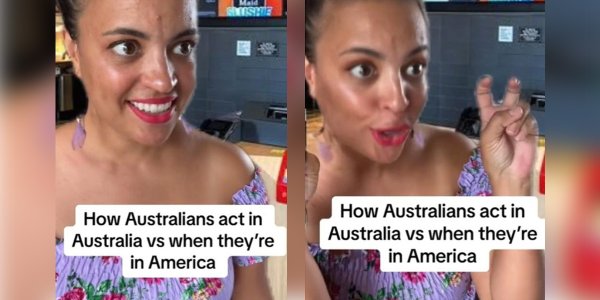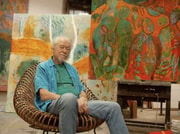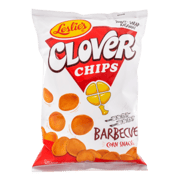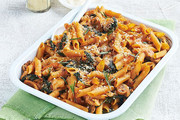Cheeky video pokes fun at Aussies' hilarious McDonald's orders in the US
By
Seia Ibanez
- Replies 9
A video on social media poking fun at the Australian accent has gone viral, racking up nearly 800,000 views.
Now, before you all go up in righteous indignation, here’s a disclaimer: an Aussie’s behind it, and it’s all in good fun!
The comedy skit was created by Aussie content creator Tamz Jade, who is known for her humorous videos exaggerating Australian stereotypes.
In the video, she acts out how Australians casually order a Quarter Pounder meal at Macca's at home, versus the over-the-top Aussie accent used when ordering the same meal in the US.
'G'day, g'day, g'day! How are ya? How ya goin'?' she greets the imaginary McDonald's worker in an exaggerated Australian English accent.

‘Can I get a Quarter Pounder meal and a soft serve ice cream, please? And can I get some extra salt on the chips and a bottle of water?’
Emphasising the word 'chips' instead of 'fries,' she looks around excitedly to see if anyone noticed her true blue Aussie-ism.
‘Oh, sorry. “Fries”,’ she then says in mock embarassment. ‘We call them chips in Australia.’
The next word she set her sights on is ‘water’, which Aussies pronounce ‘wo-dah’ as opposed to the American version with tighter vowels and emphasis on ‘r’: ‘wah-durr’.
‘Sorry, “wah-durr”. We call it “wo-dah” in Australia… just a bit different.’
The video struck a chord with Australians, who chimed in with amused comments about deliberately hamming up their accents overseas.
'My accent goes full Julia Gillard when I go to the USA. They love our accent,' laughed one commenter, referring to the former Australian Prime Minister.
'I'd never said “G'day” in my life until I was in America, and I'd forgotten how to say “Hi” apparently,' another confessed.
But while it may be entertaining to watch and listen to this video, we may need to trace the origins of Australian accent.
The Linguistic Society of America defines an accent as the way you sound when you speak.
There are two broad categories of accents: foreign accents, where a person uses some rules or sounds from another language, and local accents, which are influenced by where people live and their social groups.
If you were born or educated in Australia, you likely fall into the local group. However, even within this category, there is significant variation.
If you arrived in Australia as an adult, your accent may depend on your country of origin. For instance, you might speak English as a first language if you're from Britain or Canada, or as a second language if you were born in China or Vietnam. In the latter case, your accent is considered foreign.
Historically, researchers at the University of Sydney identified three main strands of Australian English: broad, general, and cultivated.
The majority of Australians speak a version of general Australian English with minor regional variations, which are not as distinct as dialects found in the UK or the US.
However, Australian English isn't limited to these mainstream accents. It also includes Aboriginal and ethnocultural accents, which come with their own unique phrases and speech patterns, sometimes called ethnolects.
Just like any language, Australian English evolves over time. Linguists have observed significant changes in Australian English over the past two decades, reflecting the natural evolution of language. Australian English continues to adapt and develop, reflecting the cultural and social changes of the country.
Voice Expert Amy Hume from the University of Melbourne said that younger generations are shaking up norms by adopting Americanised pronunciations for some words. You can read this story to discover them.

At the end of the day, being able to laugh at oneself is part of the Aussie spirit. This self-deprecating humour brings Aussies together, whether at home or abroad. And amplifying the Aussie accent overseas can be a great conversation starter, even if it means explaining why ice cream is called 'soft serve' and fries are 'chips.'
Do you have a similar experience when ordering at Macca’s in the US? Share your stories with us in the comments!
Now, before you all go up in righteous indignation, here’s a disclaimer: an Aussie’s behind it, and it’s all in good fun!
The comedy skit was created by Aussie content creator Tamz Jade, who is known for her humorous videos exaggerating Australian stereotypes.
In the video, she acts out how Australians casually order a Quarter Pounder meal at Macca's at home, versus the over-the-top Aussie accent used when ordering the same meal in the US.
'G'day, g'day, g'day! How are ya? How ya goin'?' she greets the imaginary McDonald's worker in an exaggerated Australian English accent.

A video on social media poking fun at the Australian accent has gone viral. Credit: @tamzjadecomedy / TikTok
‘Can I get a Quarter Pounder meal and a soft serve ice cream, please? And can I get some extra salt on the chips and a bottle of water?’
Emphasising the word 'chips' instead of 'fries,' she looks around excitedly to see if anyone noticed her true blue Aussie-ism.
‘Oh, sorry. “Fries”,’ she then says in mock embarassment. ‘We call them chips in Australia.’
The next word she set her sights on is ‘water’, which Aussies pronounce ‘wo-dah’ as opposed to the American version with tighter vowels and emphasis on ‘r’: ‘wah-durr’.
‘Sorry, “wah-durr”. We call it “wo-dah” in Australia… just a bit different.’
The video struck a chord with Australians, who chimed in with amused comments about deliberately hamming up their accents overseas.
'My accent goes full Julia Gillard when I go to the USA. They love our accent,' laughed one commenter, referring to the former Australian Prime Minister.
'I'd never said “G'day” in my life until I was in America, and I'd forgotten how to say “Hi” apparently,' another confessed.
But while it may be entertaining to watch and listen to this video, we may need to trace the origins of Australian accent.
The Linguistic Society of America defines an accent as the way you sound when you speak.
There are two broad categories of accents: foreign accents, where a person uses some rules or sounds from another language, and local accents, which are influenced by where people live and their social groups.
If you were born or educated in Australia, you likely fall into the local group. However, even within this category, there is significant variation.
If you arrived in Australia as an adult, your accent may depend on your country of origin. For instance, you might speak English as a first language if you're from Britain or Canada, or as a second language if you were born in China or Vietnam. In the latter case, your accent is considered foreign.
Historically, researchers at the University of Sydney identified three main strands of Australian English: broad, general, and cultivated.
The majority of Australians speak a version of general Australian English with minor regional variations, which are not as distinct as dialects found in the UK or the US.
However, Australian English isn't limited to these mainstream accents. It also includes Aboriginal and ethnocultural accents, which come with their own unique phrases and speech patterns, sometimes called ethnolects.
Just like any language, Australian English evolves over time. Linguists have observed significant changes in Australian English over the past two decades, reflecting the natural evolution of language. Australian English continues to adapt and develop, reflecting the cultural and social changes of the country.
Voice Expert Amy Hume from the University of Melbourne said that younger generations are shaking up norms by adopting Americanised pronunciations for some words. You can read this story to discover them.
Key Takeaways
- The viral video humorously highlights how Australians playfully exaggerate their accents when ordering McDonald's in the US.
- It reminds us that accents can be a fun way to connect and engage with different cultures, fostering a sense of camaraderie.
- Australian English is diverse, with various regional and ethnocultural accents contributing to the country's linguistic landscape.
- Language, like culture, evolves over time, and younger generations often adopt new pronunciations, reflecting changing norms and global influences.
At the end of the day, being able to laugh at oneself is part of the Aussie spirit. This self-deprecating humour brings Aussies together, whether at home or abroad. And amplifying the Aussie accent overseas can be a great conversation starter, even if it means explaining why ice cream is called 'soft serve' and fries are 'chips.'
Do you have a similar experience when ordering at Macca’s in the US? Share your stories with us in the comments!









